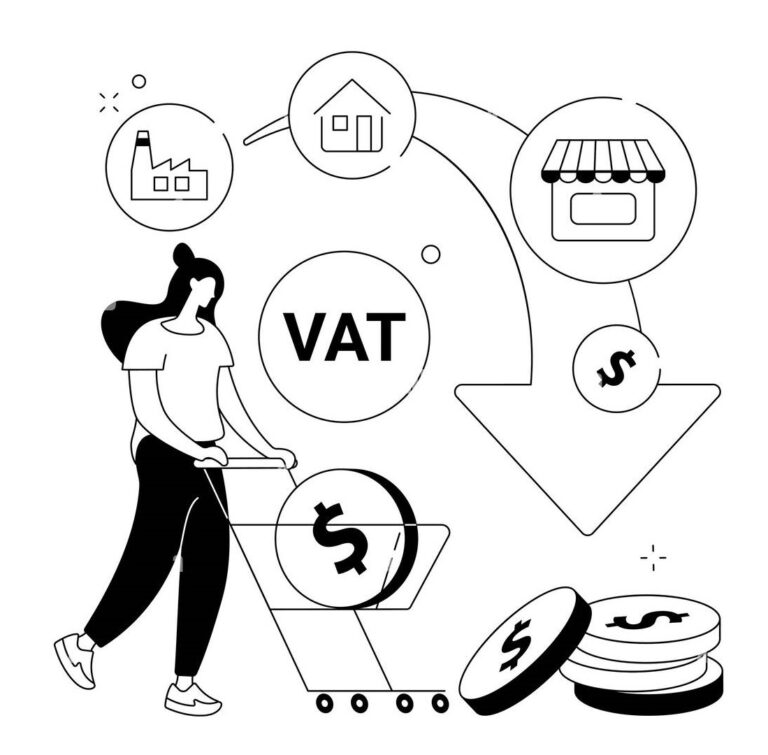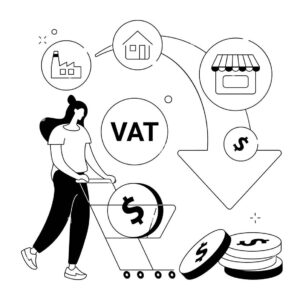Businesses in the UAE must follow the VAT – Value Added Tax laws set by the Federal Tax Authority. The VAT rate in UAE is at a standard rate of 5%. It applies to most goods and services. Companies must assess if they meet the registration threshold to avoid penalties.
What is VAT and Why It Matters in the UAE?
VAT – Value Added Tax is a consumption tax. It is applied at each stage of the supply chain. VAT is an indirect tax collected by businesses on behalf of the government. Unlike income tax, VAT is a tax on consumption, not profits.
Get Your Value Added Tax Certificate Fast in UAE
If your business revenue exceeds the registration threshold, it’s mandatory to register. Once registered, you’ll receive a certificate of registration for Value Added Tax, which proves compliance.
Who Needs Value Added Tax Registration in UAE?
Any business earning above AED 375,000 annually must complete value added tax registration. Voluntary registration is also allowed for businesses earning above AED 187,500.
A Comprehensive, Indirect Consumption Tax Explained
UAE follows a comprehensive, indirect consumption tax model. The VAT – Value Added Tax system in UAE is designed to ensure a fair tax system across all goods and services.
Why VAT is a Tax on Consumption, Not Profits
The VAT – Value Added Tax system taxes final consumption. Since it’s levied on sales, not earnings, even loss-making businesses might have VAT obligations. Proper understanding ensures accurate VAT accounting treatment.
Step-by-Step Guide to UAE VAT Registration
The process starts with creating an account on the FTA portal. You must provide trade license, financial records, and business activity details.
What is a VAT Number and Why You Need It?
Upon approval, your business receives a value added tax VAT number. This number is mandatory for tax invoices, returns, and inter-business dealings.
Value Added Tax Accounting Treatment in UAE
VAT is recorded as output VAT (on sales) and input VAT (on purchases). Accurate records are essential for reclaiming input VAT and avoiding fines.
Common Mistakes in VAT Accounting
Businesses often misclassify exempt supplies or miss filing deadlines. These lead to penalties and compliance risks.
Sector-Specific VAT Impacts in UAE Sharjah
In UAE Sharjah, VAT – Value Added Tax applies to real estate, e-commerce, healthcare, and education. Each sector has its own VAT-specific rules.
VAT Exemptions and Zero-Rated Sectors
Healthcare and education services are often zero-rated. Residential property leases may be exempt. Knowing the difference impacts your VAT filing accuracy.
Mhtaxationllc – VAT Services Near UAE SHJ
Mhtaxationllc offers full VAT services including registration, return filing, VAT accounting, and advisory in and around UAE SHJ.
Why Choose Mhtaxationllc for VAT in UAE?
We handle documentation, calculations, and submission, ensuring compliance with VAT regulations under UAE law.
How UAE VAT Compares to Other Regions
Compared to the EU VAT or U.S. sales tax, UAE’s VAT is broad and simple. The rate is uniform and exemptions are clearly defined.
GCC VAT Coordination & International Relations
UAE coordinates with other GCC countries for VAT policies. This helps streamline taxation across member states.
FAQs About VAT – Value Added Tax in UAE
Below are quick answers to common questions business owners have about VAT – Value Added Tax in UAE.
How to Correct a Mistake After VAT Filing?
You can revise your return on the FTA portal. However, repeated errors may trigger audits. Always keep documentation ready for verification.



